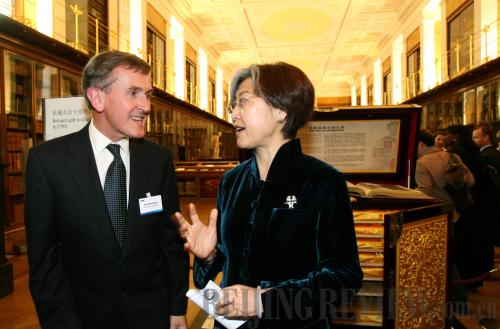|
 |
|
(COURTESY OF KERRY BROWN) |
The departure from London of Madam Fu Ying, China's Ambassador to the UK for the past three years, to take up a new post in Beijing was a reminder of the often low-profile but key work that diplomats still do.
Fu was the first female ambassador from China to the UK, and the first of Mongolian ethnicity. She came after serving with distinction in Australia, and in the Asian region where she had worked on difficult issues in Cambodia, Indonesia and the Philippines. She also had the great advantage of being familiar with the UK, having studied at the University of Kent in the mid-1980s. As she said in her leaving address in London, her love of English literature gave her not just a social bond with the UK, but also an emotional one.
 |
|
CHINA'S ENVOY: Fu Ying, Chinese Ambassador to the UK, holds a reception opening the exhibition of the Compiled British Illustrations—a series of books sent by British King George III to Emperor Qianlong of the Qing Dynasty as a gift in 1793—in the British Museum in London on May 30, 2007 (XIE XIUDONG) |
Because of the explosion of global communications systems, it might seem strange in the second decade of the 21st century there are more diplomats than ever based abroad. In the very earliest period of diplomatic history, envoys were sent, sometimes for many years at a stretch, to remote parts of the world, with only very occasional contact with their home country. They were there to gather information and to help communicate with countries that may have never had contact with each other before. They worked in great isolation. It took months for messages to and fro to be delivered.
In the 19th century, as Britain's interests increased dramatically around the world, diplomats were sent to Asia, Africa, the Americas and the Middle East. They were often powerful political figures in their own right, having enormous influence in the places where they were sent. They were a fundamental part of international relations. In the middle part of the 20th century, diplomats worked hard to avoid war, and, when global war happened, worked to deal with its aftermath. Throughout the Cold War, they were often one of the few links between countries. One of the great achievements of President Richard Nixon's visit to China in 1972 was to start having more U.S. diplomats based in Beijing.
When I started work as a diplomat in the 1990s for the British Foreign Office, I remember in one of our introductory talks being told by the head of the foreign service that even with the arrival of e-mail, fax and other communications tools, it was very unlikely "any time soon" that there would be a reduction in the need for a diplomatic service. The devastating results of the September 11 attacks in 2001 in New York only highlighted this. Before long diplomats in the United Nations, in the Middle East, and in the rest of the world, were wrestling with a new era, in which global terrorism posed a major threat.
In the early 1990s, U.S. theorists such as Francis Fukayama were talking about the disappearance of major global conflict and the start of a new period in which a kind of political stability reigned over the planet. Conflicts such as the Cold War were a thing of the past. The struggle against terrorism showed newer threats had appeared, and they were linked to religion and ideology, rather than nation states. That made them far harder to track and engage.
The face of China
Fu is an outstanding representative of one of the world's most extensive and admired foreign services. Her work in the UK is a good example of why, even with 24-hour news coverage and endless sources of information and analysis, diplomacy still matters.
The UK and China have a long historic association. The UK was one of the earliest countries to recognize the People's Republic of China (PRC) when it was founded in 1949. A British liaison office headed by a charge d'affaires was based in Beijing throughout the 1950s and 1960s. It was upgraded to ambassadorial level in 1972 after the visit of Prime Minister Edward Heath to China that year. China's Embassy in the UK actually dates back to the late Qing Dynasty (1644-1911). Sun Yat-sen, a pioneer of China's democratic revolution, even took refuge there in the early part of the 20th century while briefly based in London. The building is one of the longest continuously occupied embassies in London.
For more than a decade, the key interest between the UK and China was the handling of the return of Hong Kong to Chinese sovereignty from 1980 onwards. These discussions allowed the UK and China to start learning about each other in great depth. There were numerous ups and downs. Most of the detailed work on the final agreement for the handover was achieved by diplomats on both sides.
|
